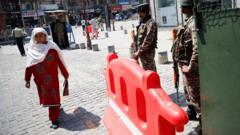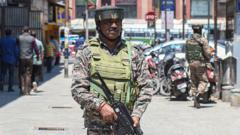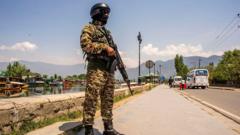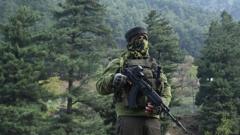The assassination of 26 individuals has intensified feelings of disconnection in a region marked by military oversight and limited rights.
# Kashmir Attack Highlights Deepening Tensions and Local Despair

# Kashmir Attack Highlights Deepening Tensions and Local Despair
The recent terrorist attack in Kashmir reveals a complex narrative of beauty contrasting with deep-seated alienation and fear among locals.
The picturesque Kashmir, often romanticized and cherished for its stunning landscapes, is facing increasing turmoil following a tragic terrorist attack that left 26 people dead. The ongoing conflict between India and Pakistan over this region has persisted for generations, exacerbated by the tightening authoritative grip of the Indian government under Prime Minister Narendra Modi since 2019. While the government promotes a narrative of growth, claiming improved security and increased tourism, many residents experience a starkly different reality characterized by repression and community alienation.
The recent attack has led to swift and aggressive actions from Indian authorities, including a large-scale manhunt for those responsible. Amidst these efforts, the impression of collective punishment prevails in the predominantly Muslim region, as thousands of locals have been detained for questioning. Additionally, the destruction of homes belonging to accused individuals has been carried out, deepening resentment.
While idyllic scenery continues to attract tourists, the underlying struggles and fears of Kashmiris prompt questions about the region's future and the ever-widening gap between official narratives and the lived experiences of its people. As the crisis unfolds, calls for international inquiry into the ongoing violence and governance have emerged, underscoring the pressing need for solutions that address the root causes of unrest in Kashmir.
The recent attack has led to swift and aggressive actions from Indian authorities, including a large-scale manhunt for those responsible. Amidst these efforts, the impression of collective punishment prevails in the predominantly Muslim region, as thousands of locals have been detained for questioning. Additionally, the destruction of homes belonging to accused individuals has been carried out, deepening resentment.
While idyllic scenery continues to attract tourists, the underlying struggles and fears of Kashmiris prompt questions about the region's future and the ever-widening gap between official narratives and the lived experiences of its people. As the crisis unfolds, calls for international inquiry into the ongoing violence and governance have emerged, underscoring the pressing need for solutions that address the root causes of unrest in Kashmir.



















